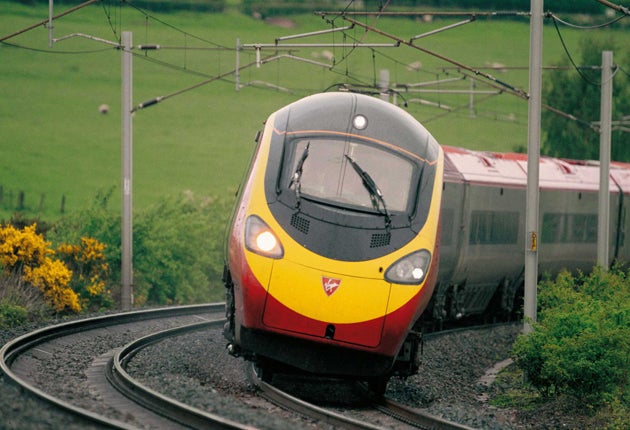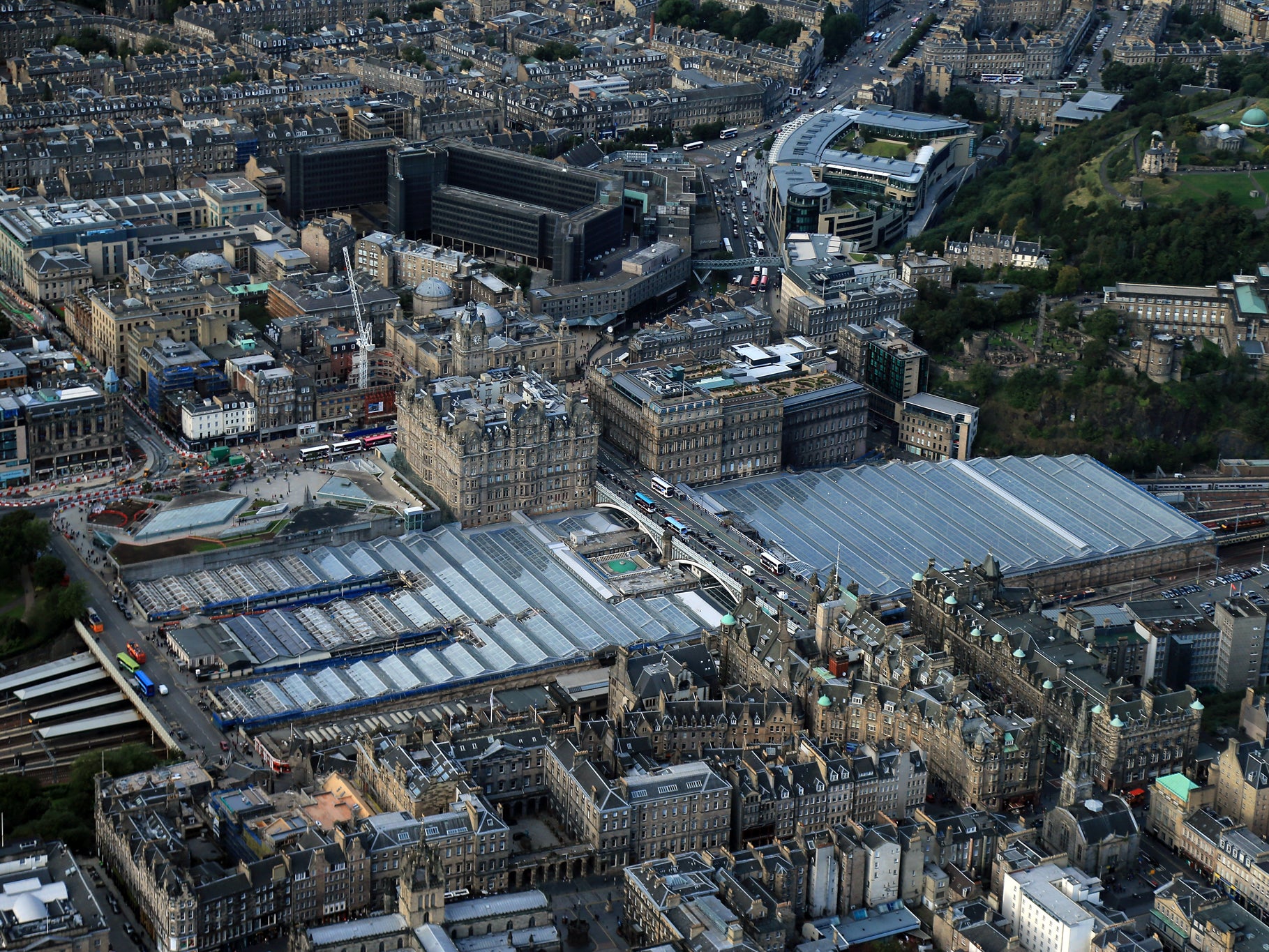Overcrowded and overpriced? Simon Calder puts Britain’s rail services to the test
The Man Who Pays His Way examines the state of Britain’s rail services on the longest mainline trip from London – to Inverness in northern Scotland
Your support helps us to tell the story
From reproductive rights to climate change to Big Tech, The Independent is on the ground when the story is developing. Whether it's investigating the financials of Elon Musk's pro-Trump PAC or producing our latest documentary, 'The A Word', which shines a light on the American women fighting for reproductive rights, we know how important it is to parse out the facts from the messaging.
At such a critical moment in US history, we need reporters on the ground. Your donation allows us to keep sending journalists to speak to both sides of the story.
The Independent is trusted by Americans across the entire political spectrum. And unlike many other quality news outlets, we choose not to lock Americans out of our reporting and analysis with paywalls. We believe quality journalism should be available to everyone, paid for by those who can afford it.
Your support makes all the difference.Every rail passenger has a view on what’s wrong with our trains, and politicians are keen to tap into the public mood by depicting the railways as overcrowded and overpriced.
Jeremy Corbyn took to the floor of the 11am Virgin Train from London King’s Cross to record a video message. He claimed that the departure to York and Newcastle was “completely ram-packed” – prompting Sir Richard Branson to weigh in with images that sought to challenge the Labour leader’s assertions about the absence of empty seats.
Ahead of next weekend’s Labour Leadership Conference to reveal whether Mr Corbyn will continue as Leader of the Opposition, I travelled on the longest main-line trip from London.
The journey extended via York, Newcastle and Edinburgh to Inverness in northern Scotland. But I didn’t take the daily direct departure from King’s Cross station; I wanted to experience four different train operators in order to see how they compared.
I bought the ticket a few minutes before departure: a “walk-up” between London and Inverness allows you to switch train operators without formality, and indeed choose a wide range of routes: I could have included Sheffield, Manchester, Birmingham and even Reading in my journey plans.
A super off-peak return between London and Inverness costs £162.50. Overpriced? Well, not in comparison with a peak single from Manchester to Watford (£166), or a rush-hour return between Bristol and the capital (£198). The “super off-peak” conditions are not too difficult to meet: basically, you can leave London between 9am and 3pm, or from 7pm onwards. Heading south, the one restriction is that you can’t catch a train that gets you to King’s Cross before 11.17am – which looks arbitrary but no doubt has a reasonable explanation.
The first link in the chain from southern England to northern Scotland was on German Railways, or Grand Central if you prefer to use the name of the subsidiary that runs trains on the East Coast main line. It is an “open access” operator that competes with Virgin Trains East Coast, serving destinations off the main network such as Pontefract and Sunderland. Crucially, it also runs non-stop from London to York, offering me a flying start on the route of the Flying Scotsman.
The Grand Central rolling stock comprises old diesel high-speed trains, the kind that have been mostly superseded on the East Coast main line by until the newer electric trains took over most of the service. About one-quarter of the seats were empty, in both Standard and First Class, including those which had a “reserved” card but are unoccupied. But “non-stop” proved wide of the mark: the train ground to a halt within a mile or two of leaving King’s Cross, for no apparent reason.
That gave me a chance to test the free on-board wi-fi. It was non-existent at first, but I assume someone gave it a kick and within half-an-hour it had woken up. Grand Central has a 50 megabyte limit per journey, which is easy to use in a couple of hours; for comparison, the Gatwick Express allows 40 megabytes on the half-hour journey between the airport and London Victoria.
After its false start, the 125mph train ran for several miles through Peterborough, which was more than enough to ensure that it arrived at York seven minutes late - too late for my connection to Cross-Country.
I had been hoping to make an “illegal” connection – nothing to do with fare dodging, but a transfer quicker than the eight minutes stipulated as the minimum required. But the unexplained delay meant I had to opt for Virgin Trains East Coast – the very train I had hoped to pick up later in the journey, at Newcastle. So I settled in for the long haul all the way to Edinburgh.

Again, about three-quarters of the seats were occupied, but lots of “no-shows” meant there was room for unreserved passengers such as me.
The train left six minutes late, due to being stuck behind the Grand Central service. A cup of tea, served at the seat, was £1.95 – five pence cheaper than its German rival – but in Carriage C, where I was, free bottles of water were distributed by the train crew after an air conditioning failure.
The free wi-fi allocation is a miserly 15 minutes, though had I booked an advance ticket direct with Virgin then I would have been sent a code for free wi-fi for the whole journey.
The “padding” that train operators employ became clear when we hung around at the last-but-one stop, Berwick, for five minutes, and arrived three minutes early into Edinburgh.
It was the height of rush-hour in the Scottish capital, but I just had time to buy a supply of food for the third and final leg; a good investment, as it turned out. Considering that Inverness is one of the key Scottish destinations, along with Glasgow and Aberdeen, the departure platform was well concealed - even harder to find than Platform 9 and 3/4 at King’s Cross, whence the Hogwarts Express departs. But I managed to board the ScotRail service with a minute to spare (or rather two, because it left 60 seconds late).

For a journey of more than three hours, the train was not exactly a long-distance, luxury affair, being basically a commuter train. After leaving Waverley with about 60 per cent of seats occupied, it filled almost to ram-packed at Haymarket, the station at the west end of Edinburgh city centre. But once over the wonderful Forth Bridge and into Fife, it started to deposit commuters rapidly, and soon its wide, open spaces mirrored the scenery outside. Furthermore the price of a cup of tea was just £1.70. What’s not to like?
Well, the time-keeping. The tiny delay at the start of the journey built up steadily to Perth, where the single-track line to Inverness begins. Trains on this stretch are scheduled in order that they can pass one another at stations where the tracks are doubled. Once services start getting out of sequence, then delays increase rapidly.
After several pauses for southbound trains, including the (also late) Sleeper to London, the train arrived in Inverness 20 minutes late.
When thumbing a ride is quicker than an inter-city train, then there’s a problem
The guard, to his credit, spent the last stretch of the journey checking with every passenger about their onward travel plans to ensure no-one was left stranded.
But both ScotRail and Grand Central showed an apparent disregard for passengers’ time, an experience that echoes through the long-distance rail network. The industry is now very good at paying compensation for extended delays, but passengers would far prefer efforts to be concentrated on running a decent, on-time service.
I happen to have hitch-hiked from Edinburgh to Aviemore, the stop before Inverness, last month, and despite a couple of longish waits outside both Dunfermline and Perth, the journey took significantly less than ScotRail train. When thumbing is quicker than an inter-city train, then there’s a problem.
From my experience between southern England and northern Scotland, long-distance trains are neither overpriced nor overcrowded; they are simply under-reliable.

Join our commenting forum
Join thought-provoking conversations, follow other Independent readers and see their replies
Comments